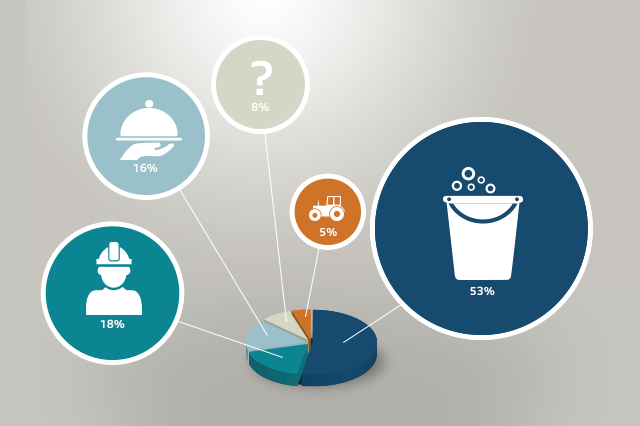
A new life for 1,000 illegal immigrants in Geneva

Some 76,000 illegal and undocumented immigrants are believed to be living in Switzerland. The canton of Geneva – home to 13,000 of them – launched a pilot project in 2015 to go about regularising them. What progress has been made?
“I heard that things were better in Switzerland,” says Purevmaa from Mongolia, recalling how she began her “underground” life here 13 years ago. Today, she is one of the 1,093 beneficiaries of the Papyrus project, a unique pilot scheme aiming to regularise long-term undocumented workers in Geneva.
Since 2005, the year she arrived in Switzerland, Purevmaa has taken on domestic work as a means of earning a living.
“A lot of other women from my country had found good jobs in Geneva,” she says. “I decided to come. I arrived when I was 24, with another girl from Mongolia, whose brother was already here. We stayed with him and found work.”
She says that as a woman, finding work in Swiss households is “easy” and that she is well-treated by her bosses. She now earns a decent wage, she says, and along with her husband can pay for her family’s needs.
It was under these circumstances that Purevmaa decided to put in an application for regularised status through the Papyrus scheme; the Interprofessional Workers’ Union (SIT) helped her with collecting the necessary paperwork.
“It took three months to get the documents together,” she says. “But the most difficult part was waiting the six months to find out their decision.”
A negative answer would have meant expulsion from the country. She was accepted.
A double objective
The Papyrus project has two objectives, according to Pierre Maudet, Geneva’s cantonal minister in charge of security and the economy.
“It serves to normalise the status of undocumented immigrants according to strict criteria within an established legal framework, and it helps to clean up those areas of the economy affected by underground employment and unfair salary competition,” he said at a press conference giving an update on the project.
The Papyrus pilot scheme officially started on February 20, 2017, but was preceded by a discreet test phase that began in autumn 2015. Since then, a total of 1,093 illegal workers (244 families, eight childless couples, 291 singles) have received their permits. Just four people were rejected and deported. This total figure is expected to rise to 2,000 by the end of the project in December this year.
“This is not a collective regularisation, nor an amnesty, but rather a case-by-case evaluation”
Mario Gattiker, SEM
Papyrus has received widespread attention, and despite being a Geneva-only project, the federal government was also persuaded to back it. For Bern, it represents “an interesting exploratory path for treating the issue of migration and illegal work,” said Mario Gattiker, head of the State Secretariat for Migration (SEM).
But Gattiker points out that the granting of residency permits to illegal immigrants remains a job for federal authorities. Papyrus applications are examined within existing legal frameworks and the project is “not a collective regularisation nor an amnesty, but rather a case-by-case evaluation”, he said.
The scheme is also the outcome of a long battle waged by organisations defending the rights of undocumented workers. Over a period of about 15 years, they worked together on a widespread information campaign to try to find those who might meet the criteria to qualify for regularisation.
- Prove their financial independence
- Declare all current employment
- Be free of debt and legal proceedings
- Have lived continuously in Geneva for 10 years (five if with school-aged children)
- Be able to speak basic French
Some 3,000 people have applied for assistance through the programme since February 2017, according to Marianne Halle of the Swiss-Immigrant Contact Centre (CCSI).
According to a survey conducted by the University of Geneva, the largest group of applicants have been from Latin America. Some 80% of regularised dossiers have come from this region, notably Brazil, Bolivia, and Colombia. Another 10% were from Eastern Europe (Kosovo, Macedonia, Bosnia), 6 % from Asia (Philippines, Mongolia), and 3% from Africa (Morocco, Algeria, Tunisia).
Many do not fulfil the conditions; as many as 13,000 illegal immigrants remain in Geneva, according to the SEM. Remy Kammermann, a lawyer with the Protestant Social Centre, says that these people are not eligible to apply for Papyrus “whether as a result of outstanding debts or because their income is not sufficient to justify their staying here”.
But for those, like Everton from Brazil, who manage to meet the conditions and gain a valid status, the change in daily life and stress is significant.
Mixed reactions
As the project continues in Geneva – where some 15 dossiers are sent for examination each week – it’s attracting interest and criticism both inside and outside the canton. The local chapter of the conservative right Swiss People’s Party reckons that the scheme sends a “disastrous signal” and will simply attract more illegal immigrants to the region. It wants the project stopped and has has initiated parliamentary initiatives against Papyrus in Geneva and Bern.
Geneva already hosts about 17% of Switzerland’s illegal immigrants, according to 2015 statistics. And prior to Papyrus, the canton had also been far more active than the rest in regularising them (see graphic).
Zurich, home to the largest number of illegal immigrants, only regularised the status of 10 of them over the period from 2012-2016. Lawyer Kammermann says that “many authorities in German-speaking parts of Switzerland deny the problem, which is surprising for a canton [Zurich] with an estimated 25,000 to 30,000 undocumented immigrants.”
In German-speaking Switzerland, as well as in the Anglo-Saxon world, he says, the argument is often heard that “one shouldn’t help undocumented immigrants, as this would be seen as rewarding them for their illegal situation”.
But many are closely watching the situation in Geneva. SEM head Gattiker doesn’t exclude the possibility that “certain cantons are waiting for the final evaluation of the Papyrus project in order to analyse the possibility of applying a similar programme, adapted to particular conditions”.

More
The uncertainty of life as an illegal worker

In compliance with the JTI standards
More: SWI swissinfo.ch certified by the Journalism Trust Initiative
































You can find an overview of ongoing debates with our journalists here . Please join us!
If you want to start a conversation about a topic raised in this article or want to report factual errors, email us at english@swissinfo.ch.